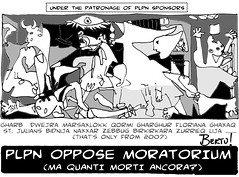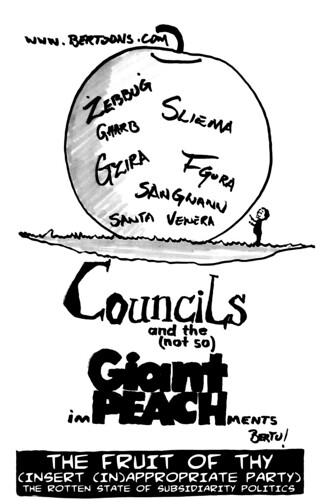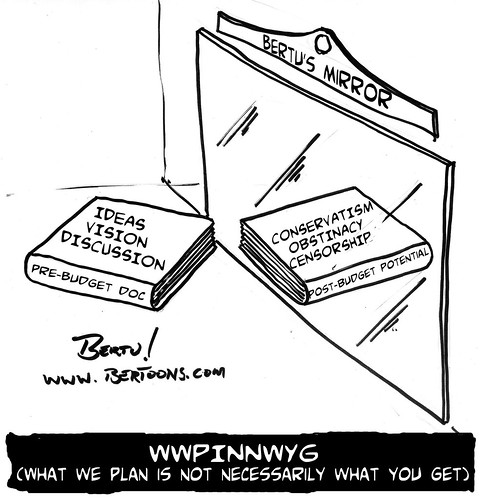Drums keep pounding a rhythm to the brain
We don’t miss a beat do we? (Bang) The firework ‘factory’ explosion shook the island of Calypso to its foundations and in the end six people lost their lives. (Oompa-oompa) In a display of insensitivity that not only beggars belief but shoots it in the head from close range with a high-calibre pistol, the festivities in the village of Xaghra celebrating Our Lady of Victories went ahead as planned. (Ka-ching) One of the reasons we were given for this victory (triumph) of insanity was that the firework factory was a private one and only a supplier of processed chemicals to the feast – besides, why fritter away more money than had already gone up in smoke?
You’d be forgiven for thinking that Xaghra is to Gharb as Selawik (Alaska, USA) is to Mararikulam (Kerala, India). (Kaboom). The beat went on nevertheless and as the week rolled by the nation heard that a whole branch of a family tree had been summarily dismembered thanks to yet another supply of jeux de feu (gioco di fuoco – the archaic Italian and French terms for firework translated to Maltese as gig-gi-fogu) going wrong.
The beat went on all right, as the mediatic revelry of reporting broke new ground with the scramble for the best amateur video of the moment of the explosion. The drama was brought home as emphatically as possible, and the bombastic seriousness with which village festas were hitherto treated suffered a momentary lapse of favour with the general public. (Incidentally, like last week, this weeks’ article comes with suggested listening – Charles Camilleri’s Malta Suite – Village Festa). That temporary moment of anger at the futile loss of lives and the toying with public safety that is so evidently part of everyday life on the island is always intriguing to follow – if only for the volatility it displays until the next earth-quaking, window-shattering, child-frightening mother of all explosions reminds us that on this rock even a “remote factory” means your backyard. (Boom)
Charleston was once the rage, uh huh
Our representatives and legislators have not missed a beat either. Messages of condolence are now as much of a part of Normality Inc. as young men playing with dangerous explosives in tank tops (known in jargon as “wife-beaters”) and flip-flops. I am quite sure that these messages of condolence now come in a pre-drafted variety complete with blanks to fill. (Ta-ta-ra-ta-ta). It sounds cynical, I know, but it looks like we have begun to think of fireworks, firework factories and the like in the same manner as the US intervention in Afghanistan. There is collateral damage, there are civilian casualties and we keep sending our young troops to the front-line – some of them never come back and die the death of “heroes” for a greater cause.
What bollocks. What bullshit. What a load of absolute crap. I’m sorry, but if the idea of young men (and women) toying with their lives (ghan-namur, boom boom) does not make your blood boil with anger then you are about as sensitive and sensible as a Xaghra Feast Committee member. (Oompa-oompa). If you fail, for just one minute, to notice that it is not just the lives of these volunteers of doom that are endangered but also those of the community in the immediate surroundings, then you must be as intellectually blind as a brainless ocelot (damp squib). I know it’s as cliché as “l-innu marc” but it’s a fact that seems to fail to penetrate the mind of even the most upright politicians.
Enter Michael Falzon (Labour MP) with his comments on a moratorium on production. Such a moratorium, the learned member tells us, would be “stupid” and “irresponsible”. The legal representative of the Malta Pyrotechnics Association (Boom, Bang, Du-dum) reasons that (a) it would only drive such production underground (one would assume that he means that this time the firework producers would be working underground instead of lying horizontally post-blast) and (b) once the moratorium is over, production would only occur more frenetically than ever thus endangering more people. (Drumroll followed by explosion of petards).
In the words of the crazed tennis player, we can only reply: “You cannot be serious!” Since when does the threat of illegal behaviour prove that strict legal measures are useless? Are we not to assume that the moratorium would be used to tighten regulations, to finally realise that the proliferation of firework factories on a tiny speck in the sea is not exactly kosher, to (hopefully) restrict it to one very tightly regulated affair manned by experts? Does Michael Falzon (and the Nationalist counterparts who probably thanked the God of explosives that he is taking the flak) realise that a moratorium is not simply a pause for breath?
History has turned the page, u-huh
It just won’t work will it? Not the moratorium. The general idea of persuading the island of “Saints and Fireworks” that the time might have come to switch from pyrotechnics to some other, safer variety that bears in mind the constraints in terms of space and safety. I am a huge fan of son et lumière and am prepared to bet that the first village that switches to an eco-friendly, human-friendly experience of a display of lighting timed to music will provide the best example to the rest of the community. Sure – an elaborate light system to light up the jewels that are our many churches and piazzas will cost money and will develop over time, but even Our Lady would tell you of its many positive advantages if she could. To begin with, the system does not go up in smoke every year and can be built upon rather than starting from scratch.
I know, I know – this is as utopian an idea as the regulation of political party financing. That too is another area where the grim reality of the network of trading in influences is only acknowledged every now and then by the regular voter before he or she switches off and back to the partisan mentality. We saw a glimpse of recognition with the firework factory problem itself. Party MPs’ hands were tied and it was obvious to many that their reluctance to take action was directly linked to the fact that the very people engaging in the “namur” (hobby) of fireworks and explosives are the same people who fund the individual campaigns for election to Parliament. They are the same campaigns that either go undeclared or end with false oaths that they have not overstepped the spending limit.
Alternattiva Demokratika has not failed to gain political mileage from the issue by accusing the two parties of insensitivity and of forming an “alliance of death”. There goes the bombastic wartime lingo all over again (you must forgive AD for engaging in superlatives in most of their attempts to attract the unwilling attention of the blinkered populace). It may be hard to picture Lawrence and Joseph as some latter day Ahmadinejad and Kim Jong Il but there is a point to be made here.
The grocery store’s the supermart, uh huh
Over at J’accuse we have been pressing the alarm bells for almost six years now. Recently we have enjoyed the eminent company of Franco Debono (PN MP) and Leo Brincat (PL MP) in the call for transparency of party funding. It is a core, basic element in the functioning of a democracy – that parties are transparent about their ties and dependencies. In a damascene conversion, fellow columnist Caruana Galizia seems to have finally realised this most basic of democratic realities and penned an interesting article last Thursday about the negative side of party financing. Confoundingly, Caruana Galizia ended her article with an accusation directed primarily towards Joseph Muscat – as though he is ultimately responsible for the introduction of new legislation on funding.
Funny, I thought that the business of government was to govern and that right now the government was composed of PN MPs. Funny, when last election I urged people to vote for the third choice as a direct message to the two parties that continue to ignore basic democratic precepts of representation, I was subjected to a barrage of attacks branding me (and other J’accuse readers) as “irresponsible” for even risking the possibility of Alfred Sant governing the country. Funny, the reason for that barrage seemed to be that we can only count on PN legislators for responsible legislation. Funny, but the AD argument on the need for more transparency at the time seems to come back and haunt the very “pragmatic” naysayers of the past. The AD tune does not sound so dissonant does it? A plague on both your houses, indeed.
In actual fact, we don’t need Joseph Muscat’s Labour to implement new transparency rules. Lawrence Gonzi’s PN, elected so responsibly in order to avoid the dangers and pitfalls of that monster Sant and Labour (wasn’t that the description?) has the majority he needs to get the law into place. It’s that government born out of the partisan rules that were writ to exclude third voices as much as possible and provide the relative majority with the power to enact laws for the good of the nation. They shouldn’t miss a beat. They should simply look at valid voices like that of Franco Debono, who has been yelling loudly for the dignity of Parliament, the transparency of funding and proper democratic representation.
Boys keep chasing girls to get a kiss
But they will miss that beat. There will always be an excuse not to introduce much needed legislation that affects the representation and government of the people. The intricate power web and dealing in interests is too well spun to be dismantled so easily. This is not some big conspiracy theory about powerful men sitting in a room. It is an idea that has spread through usage and custom. An idea that patronage, sponsorship and monetary support exchanged for political favours is the way to advance in the corridors of power. An idea that favours and obligations trump democratic representation and loyalty. An idea that the bipartisan machine is fed with the money of the favoured and it feeds them back with the regulations they require.
Ideas spread faster than actions and before you know it the notion of favours, backhanders and trading in influences has pervaded our political culture at all levels and is considered as normal. That is the sad truth about this country. Firework factories too close to “civilian” buildings for comfort but we barely blink and the beat will go on as it always has. The idea settles in our minds and we think that men in flip-flops handling dangerous explosives is normal. We will barely flinch four months from now when sweet nothing happens again. And who do we have to blame? Mike Briguglio was subtle last week when he said: “You have your vote. Use it.” I prefer the words by V (in “V for Vendetta” by the Wachowski Brothers): “Well, certainly there are those more responsible than others, and they will be held accountable, but again truth be told, if you’re looking for the guilty, you need only look in a mirror.”
And the beat goes on, yes, the beat goes on
I type this article on the 11th of September – 9/11 for Americans. The world news is stuck on the US commemoration of events nine years ago. A bigot pastor somewhere in the US has hit the headlines for his ridiculous idea of burning a book that is holy to millions of people across the world. This has sparked reactions as far off Afghanistan and Pakistan and condemnations from the civilised world. It’s not as simple as good versus evil and there are many factors to consider (media coverage is one of them), but sometimes you do have to wonder how much more damage can be done in the name of God and his Saints.
My deepest condolences to the President and Prime Minister for their loss. It’s been a week of unhappy coincidences for fathers of politicians (David Cameron). I would also like to take this opportunity to wish a good and peaceful Eid el-Fitr to all Muslim readers.
www.akkuza.com’s beat goes on. It wasn’t Buddy Rich originally but Sonny and Cher — yes the headings were from that song… will you manage to get it out of your head?
Related articles by Zemanta
- Appeal on deadly fireworks explosion to be held in Oct. (charlotte.news14.com)
- The Fireworks Laws of Every State [Fireworks] (gizmodo.com)
- China officials shut fireworks plants after blast (seattletimes.nwsource.com)
- Two Reminders That Fireworks are Dangerous (bostonist.com)
- Are there fireworks that are safer for the environment than traditional fireworks? (greenanswers.com)
- 4th of July Vid Picks: Fireworks Go BOOM! (newteevee.com)
- Fireworks (netnewmusic.net)












